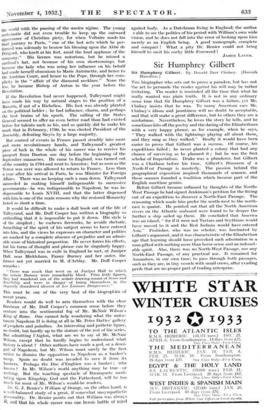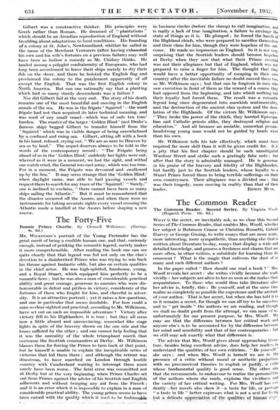Sir Humphrey Gilbert
Tun biographer who sets out to prove a paradox, but has not the art to persuade the reader against his will may be rather irritating. The reader is reminded all the time that what he really wanted was plain truth. It is not in any ordinary sense true that Sir Humphrey Gilbert was a failure, yet Mr. Chidsey insists that he was. To many American ears Mr. Chidsey's idiom and jauntiness will no doubt be acceptable, and that will make a great difference, but to others they are a misfortune. Nevertheless, he loves the story he tells, and he sometimes hits off the poetry and the daring of the Elizabethans with a very happy phrase, as for example, when he says, " They walked with the lightnings playing all about them,- and they sang as they walked." Really it would have been easier to prove that Gilbert was a success. Of course„ his expeditions failed ; he never planted a colony that had any chance of surviving as he planned it ; but he was the first scholar of Imperialism. Drake was a plunderer, but Gilbert was a Chatham before his time. Gilbert's Discourse of a North-West Passage is masterly. The passion behind the geographical exposition inspired thousands of seamen, and those seamen founded a tradition which became part of the English maritime genius.
Before Gilbert became inflamed by thoughts of the North. West Passage he had signed Jenkinson's petition for the fitting out of an expedition to discover a North-East Passage. The reasoning which made him prefer the north-west to the north- east is quaint. He pointed out that all the North American rivers on the Atlantic seaboard were found to be deeper the further a ship sailed up them. He concluded that America was an island, for if it were not Tartars and Scythians would have moved to it and the Red Indians would have entered Asia." Frobisher, who was no scholar, was fascinated by Gilbert's argument, and it was characteristic of the Elizabethan age that learning should have provoked such admiration in a man gifted with nothing more than horse-sense and an indomit- able spirit. Alas, there was no North-West Passage, nor any North-East Passage, of any practical use. It remained for Amundsen, in our own time, to pass through both passages, such as they are, in tiny vessels with small crews, after evading perils that are no proper part of trading enterprise. Gilbert was a constructive thinker. His principles were Creek rather than Roman. He dreamed of "' plantations " which should be an Arcadian reproduction of England without troubling about adaptations to local conditions. His founding of a colony at St. John's, Newfoundland, whither he sailed in the name of the Merchant Venturers (after having exhausted his.own and his wife's fortunes on a previous failure) may well have been as hollow a comedy as Mr. Chidsey thinks. He landed among a polyglot confraternity of Europeans, who had long been accustomed to leave their ships merely to dry their fish on the shore, and there he hoisted the English flag and proclaimed the colony to the puzzlement apparently of all except the English. That was the firSt English colony in *firth America. But can one rationally say that a planting Which had so many sturdy descendants was a failure ?
Nor did Gilbert fail at the very end. The story of his death remains one of the most beautiful and moving in the English annals of the sea. He was in the frigate Squirrel '—the -word frigate had not then acquired its later technical meaning, and as used of any small vessel—which was of only ten tons' burden. The master of the larger Golden Hind' (not Drake's iamous ship) begged Gilbert to transfer himself from the 'Squirrel' which was in visible danger of being overwhelmed by a confused and rising sea. Gilbert, sitting aft with ,a book in his hand, refused, crying out, "We are as near to Heaven by sea as by land." The sequel deserves always to be told in the words of the contemporary record : "The Frigate being ahead of us in the Golden Hind,' suddenly her lights were out, 'whereof as it were in a moment, we lost the sight, and withal Our watch cried, the General was cast away, which was too true. For in a moment, the Frigate was devoured and swallowed up by the Sea." It may seem strange that the Golden Hind,' sivhen daylight came, was able to hail passing vessels and request them to search for any trace of the Squirrel.' "Surely," one is inclined to exclaim, "there cannot have been so many, ships sailing the Atlantic." But it must be remembered -that the disaster occurred off the Azores, and when there were no instruments for taking accurate sights every vessel crossing the Atlantic made a landfall at the Azores before shaping a new course.











































 Previous page
Previous page